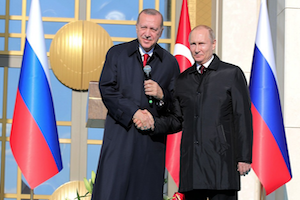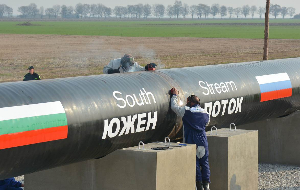The Middle Corridor Calls for Turkish-European Cooperation
By Barçın Yinanç
January 17, 2022
While it was fear of Russia that prevented the Central Asian countries from showing an interest in the Middle Corridor, it is ironically the same Russian factor that has today led to the reinvigoration of this alternative to the Northern Corridor. However, crucially, the future of the Middle Corridor depends on European interest and particularly on the European Union revising its attitude toward Turkey that has been spearheading the project for more than a decade and that is indispensable to its realization. European decision makers must recognize that they need to join hands with Turkey to make the Middle Corridor come to fruition.

The Akkuyu Nuclear Power Plant and Deepening Turkish-Russian Relations
By John C. K. Daly
July 5, 2018
For years Turkey, which imports 90 percent of its energy needs, has considered any and all options to lessen its import costs, including nuclear. The country’s energy requirements have persistently pitted the government against the country’s environmentalist lobby, one of the strongest in the Middle East. Despite such concerns, Turkey’s nuclear lobby has scored a decisive victory, as the ground has been broken for the nation’s first nuclear power plant (NPP) at Akkuyu on the southern Mediterranean coast.
Akkuyu will consist of four 1,200 megawatt (MW) VVER reactors producing a total of 4,800 MW. The Akkuyu NPP, being constructed by the Russian state nuclear energy corporation Rosatom, is projected to meet 10 percent of Turkey's future energy requirements. The first unit of the plant is scheduled to come online in 2023, with the NPP’s overall cost projected to be $20 billion.
KEY ISSUE: On April 3 President Recep Tayyip Erdoğan hosted Russian President Vladimir Putin at the presidential complex in Ankara, where they attended via teleconference the Akkuyu NPP groundbreaking ceremony, an event described by Erdoğan as a “historic moment.” Putin remarked, "It is difficult to overestimate the significance of this large-scale, innovative project. In essence, today we are not only witnessing the construction of Turkey's first nuclear power plant, but we are also creating the basis of Turkey's nuclear industry as a whole.” Despite such optimism about bringing the facility’s first reactor online in 2023, the 100th anniversary of the Republic of Turkey, as highlighted by both Putin and Erdoğan in their ceremonial speeches, it remains to be seen whether such an ambitious agenda will be fully implemented in the future.

Turkey Temporarily Stands Down in Eastern Mediterranean Amidst Region-Wide Backlash
By Micha’el Tanchum (vol. 8, no. 2 of the Turkey Analyst)
With the close of 2014 witnessing the beginning of a de facto anti-Turkey bloc emerging in the eastern Mediterranean among the four countries with whom Turkey is in contention, the Turkish government has attempted to reduce tensions by removing a seismic exploration vessel and its escort ships from an area where the Republic of Cyprus has been drilling for offshore energy. However, the stand-down is likely to be temporary as campaigning intensifies in the run-up to Turkey’s all-important June 2015 parliamentary elections.

South Stream, Russia and Turkey: What Does The Deal Mean?
By Stephen Blank (vol. 7, no. 22 of the Turkey Analyst)
The announcement that the original South Stream is being closed, and is instead going to be redirected through Turkey, is of epochal significance. However, it is by no means certain that Russia and Turkey can pursue antagonistic policies geopolitically and simultaneously maximize the benefits of their deepened energy relation and increased economic cooperation. And in its eagerness to become a gas hub, Turkey has severely limited the possibilities for Ukraine, Azerbaijan, and Central Asian gas producers to break free of Moscow’s energy grip.

Trans-Anatolian Pipeline: a Geopolitical Achievement, but no Panacea for Turkey's Energy Independence
By M. Kemal Kaya (vol. 5, no. 14 of the Turkey Analyst)
The realization of the Trans-Anatolian Project by 2018 will strengthen Azerbaijan in strategic terms, offering it a route to the world markets that bypasses Russia. The realization of TANAP is a significant geostrategic setback for Russia. However, TANAP is no panacea for Turkey’s energy predicament. Turkey will remain dependent on Russia as a natural gas supplier.





